Becky
Something happened to me recently that I never thought would happen – I stood back and took a look at my life, and I was happy with it. I was happy with the people I’d surrounded myself with, the work I was doing towards my ambitions, and the experiences I was having day to day.
Since I was a kid, I had a sense of not belonging. I stood out and got bullied at school, I was the black sheep of my family, and I was never really comfortable in my own skin. I didn’t get on well with my parents the majority of the time, and I took every argument and insult personally; I took everyone’s criticism and casual slights and I convinced myself that I was a bad person who didn’t deserve to be happy. I believed that I was responsible for everything bad that happened – my parents’ divorce, the five years that I didn’t speak to my father, the conflicts with my stepparents, the fact that I found it almost impossible to make friends.
The first time I intentionally hurt myself I was 14. I had an argument with my mother, and I was so frustrated and unable to express my feelings that I took a piece of broken glass and cut myself with it. The feeling afterwards was a mixture of relief and guilt – I knew what I was doing was ‘wrong’, but it felt like I had some control over what was affecting me. That first time, my Mum found out, and decided that I needed to go to counselling to work through some of my issues. The problem was, I never let myself open up – because I was so convinced that I was a bad person, I didn’t want to tell my parents or the counsellor how I really felt for fear of being judged and found lacking. I lied to them all that the cutting was a one-off, and that I felt better, and that everything was fine. I carried on cutting myself almost every other day for the next three years – small cuts that I hid, hoping nobody would notice. It became my little secret, and I suppose I revelled in the self-pity of it – if I had a bad day at school, or an argument with my parents, or boy trouble, I would lock myself in the bathroom and hurt myself, and feel that at least there was something they couldn’t take away from me.
I went through a really rough patch when I was around 18. I left home in a fit of rage, and didn’t speak to my Mum for about six months; I moved to a different town where I didn’t know anyone, to live with family that felt more like strangers. A friend I worked with died unexpectedly, at a tragically young age. I had planned to spend my gap year before uni travelling with my boyfriend, but we broke up, and I broke down. I was diagnosed with clinical depression, and spent an unhealthily long time in bed eating pizza and watching crappy TV. I still felt that there was nobody I could really talk to about how I was feeling and why I was so helpless and out of control. I spent most of my time crying, and the rest of the time telling other people how fine I was and how much better I was feeling.
The only thing that really helped me to work through how I was feeling was my art – I’d throw paint and wax and ripped pieces of magazines at canvases and scrawl my emotions across them. It was cathartic, and sometimes it even replaced my need to hurt myself.
Things slowly started changing for me once I started at university. I moved back to Cardiff, got a new job, and started getting to know new people. One of the big surprises for me was that people had no preconceptions about me – I could be who I wanted to be, rather than the scarred product of previous years that I had become at school and college. I was making friends all over the place, and the more people I met, the easier it became. There were still moments when I told myself that I didn’t deserve other people’s respect and affection, and those were the times I tended to make bad decisions, usually involving drinking too much and waking up in strange places. It was around this time that I was introduced to Heads Above The Waves. It hadn’t really started out yet, but I spoke with Si and told him my story, and he shared his with me; it was a pivotal moment. I finally realised that other people had been through similar things to me, and had come through the other side. I think that was the first time I really had a glimmer of hope that I could get better. Si explained to me how music helped him cope with his bad days, and from that I recognised that I could use my art to vent my feelings in a healthy way – that I didn’t have to be a slave to the need to hurt myself.
From there, things have been slowly getting better and better. I’m coming to the end of my second year in uni now, and I’m doing pretty well. I have a fantastic group of friends who know my story, and the dark places I’ve been, and love me anyway. I’m even on good terms with my parents, after a lot of hard work. It’s not easy, and I still have bad days, but it’s getting easier. I’m learning ways to deal with the hard times – if I feel myself slipping into a dark mood, I try to distract myself by going to see a friend, or starting a new collage, or just going to sit in the garden and think about something happy. I’ve become a lot more open with my feelings as well – I have no problem now saying to my housemates or the people I work with, “I’m in a bad mood, but there’s nothing wrong. I just need to have a cuppa and wait for it to blow over.” I’m starting to understand that you can’t always be happy, but you can choose to focus on the good stuff, and you can find ways to work around or change the things that are bringing you down. It’s been three months since I even felt close to cutting myself, and for me that’s a massive achievement. It IS possible to get better, you just have to believe it – believe that there are people out there who understand and care. You don’t have to fight it alone, and it will get better.
– Becky
Things to take from Becky’s story:
- Talking to someone else about what you’re going through is a big step. But it works best if you’re completely open and honest about it. That might be with someone you know and trust, a counsellor or a helpline, who are bound by confidentiality.
- Talking doesn’t even need to be an intense conversation. Sometimes all you need to say is “I’m just in a bad mood today”; just letting people around you know what’s going on means they can help.
- You might find art to be a helpful and cathartic way of working through your feelings. The best part is: it doesn’t need to be a masterpiece. Just throwing things at a piece of paper or scribbling down what’s in your head can make some of the best artwork.
- A fresh start, at a new school, moving to uni, or a new job, can mean that people don’t have any preconceptions about you.
- Try and spot when you’re getting into a dark mood, and do something you know will make you feel better.
- Getting out of the house if you’re feeling the urge to self-harm can be a good short-term fix. Why not try visiting a friend, or even just sitting outside in a change of scenery.
Take a look at some of Becky’s artwork below:
Enjoy this post? Feel free to share
More posi-content
Have you found a creative way of overcoming self-harm and keeping your head above the waves? Share your experiences to inspire others!
find out more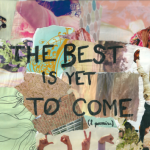
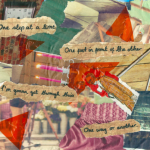
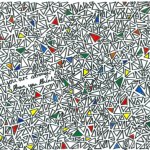
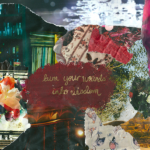
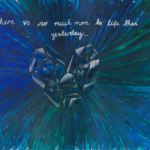
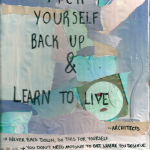
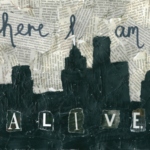

0 comment/s